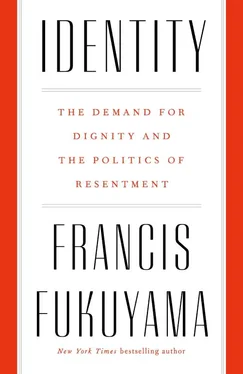Second, national identity is important for the quality of government. Good government—that is, effective public services and low levels of corruption—depends on state officials placing public interest above their own narrow interests. In systemically corrupt societies, politicians and bureaucrats divert public resources to their own ethnic group, region, tribe, family, political party, or to their own individual pockets because they do not feel obligated to the community’s general interests.
This points to a third function of national identity: facilitating economic development. If people do not take pride in their country, they will not work on its behalf. The strong national identities in Japan, South Korea, and China produced elites that were intensely focused on their countries’ economic development rather than on their personal enrichment, particularly during the early decades of rapid economic growth. This kind of public-directedness underlay the “developmental state” and was much less common in such regions as sub-Saharan Africa, the Middle East, or Latin America. {5} 5 The rapidly developing states of East Asia had problems with corruption, but at levels generally lower than in other parts of the world. The elite focus on national development made possible the “developmental state” in countries such as Japan, South Korea, Singapore, and China. While such states have been said to exist in African countries such as Rwanda or Ethiopia, or in Chile under the Pinochet dictatorship, these have tended to be the exception rather than the rule. See Stephan Haggard, Developmental States (New York: Cambridge University Press, 2018).
Many identity groups based on ethnicity or religion prefer to trade among themselves and use their access to state power to benefit their group alone. While this may be of help to an immigrant community newly arrived in a country, their future prosperity will depend critically on their ability to assimilate into the larger culture. Economies thrive on having access to the widest possible markets, where transactions will be completed without regard to the identities of the buyers and sellers—provided, of course, that national identity does not become the basis for protectionism against other nations. {6} 6 See Francis Fukuyama, Trust: The Social Virtues and the Creation of Prosperity (New York: Free Press, 1995).
A fourth function of national identity is to promote a wide radius of trust. Trust acts like a lubricant that facilitates both economic exchange and political participation. Trust is based on what has been called social capital, that is, the ability to cooperate with other people based on informal norms and shared values. Identity groups promote trust among their members, but social capital often remains limited to the narrow in-group. Indeed, strong identities often decrease trust between in- and out-group members. Societies thrive on trust, but they need the widest possible radius of trust to do well. {7} 7 Ibid.; Robert D. Putnam, Bowling Alone: The Collapse and Revival of American Community (New York: Simon and Schuster, 2000).
A fifth reason national identity is important is to maintain strong social safety nets that mitigate economic inequality. If members of a society feel that they are members of an extended family and have high levels of trust in one another, they are much more likely to support social programs that aid their weaker fellows. The strong welfare states of Scandinavia are underpinned by their equally strong senses of national identity. By contrast, societies divided into self-regarding social groups who feel they have little in common are more likely to regard themselves as in a zero-sum competition with one another for resources. {8} 8 This argument is made in Craig J. Calhoun, “Social Solidarity as a Problem for Cosmopolitan Democracy,” in Identities, Affiliations, and Allegiances , ed. Seyla Benhabib, Ian Shapiro, and Danilo Petranovic (Cambridge: Cambridge University Press, 2007).
The final function of national identity is to make possible liberal democracy itself. A liberal democracy is an implicit contract between citizens and their government, and among the citizens themselves, under which they give up certain rights in order that the government protects other rights that are more basic and important. National identity is built around the legitimacy of this contract; if citizens do not believe they are part of the same polity, the system will not function. {9} 9 A classic argument for national identity as one of the necessary conditions of modern liberal democracy was made by Dankwart A. Rustow, “Transitions to Democracy: Toward a Dynamic Model,” Comparative Politics 2 (1970): 337–63.
But the quality of democracy depends on more than mere acceptance of the system’s basic rules. Democracies need their own culture to function. They do not produce automatic agreement; indeed, they are necessarily pluralistic collections of diverse interests, opinions, and values that have to be reconciled peacefully. Democracies require deliberation and debate, which can happen only if people accept certain norms of behavior on what can be said and done. Citizens often have to accept outcomes they do not like or prefer, in the interest of a common good; a culture of tolerance and mutual sympathy must override partisan passions.
Identity is rooted in thymos, which is experienced emotionally through feelings of pride, shame, and anger. I’ve already noted the ways in which this can undermine rational debate and deliberation. On the other hand, democracies will not survive if citizens are not in some measure irrationally attached to the ideas of constitutional government and human equality through feelings of pride and patriotism. These attachments will see societies through their low points, when reason alone may counsel despair at the working of institutions.
The policy issue that has raised the greatest challenges to national identity is immigration, and the related issue of refugees. Together, they are the driving force behind the upsurge of populist nationalism in both Europe and the United States. France’s National Front, the Freedom Party in the Netherlands, Viktor Orbán’s Fidesz in Hungary, the AfD in Germany, and the Brexiteers in the United Kingdom are both anti-immigrant and opposed to the European Union. But for many populists, these are the same issue: they intensely dislike the EU because they think it is depriving them of their sovereign right to control their own borders. The EU had created the Schengen system of visa-free travel within most of its member states in 1985, in the interests of labor mobility and economic growth. In addition, the EU has granted extensive rights to refugees once they enter Europe, rights that are enforced not by national courts but by the European Court of Human Rights. [4] The Schengen zone overlaps with but does not completely correspond to either the EU or the eurozone; some EU countries such as Ireland and the United Kingdom opted out, while non-EU states such as Iceland and Norway are de facto parts of the zone.
This system has worked as advertised, allowing labor to flow to areas where it can be used more productively, and offering refuge to victims of political persecution. But it has also led to massive increases in the numbers of foreign-born individuals in many EU countries, an issue that came to a head in 2014 when the Syrian civil war sent more than a million Syrians into Europe.
Similarly, in the United States, immigration has largely displaced class and race as the chief reason why Americans vote for Republican candidates, according to data by political scientists Zoltan Hajnal and Marisa Abrajano. {10} 10 Zoltan L. Hajnal and Marisa Abrajano, White Backlash: Immigration, Race, and American Politics (Princeton, NJ: Princeton University Press, 2016).
The incorporation of African-Americans into the Democratic Party following the civil rights movement of the 1960s is widely credited for driving the South into the arms of the Republican Party; today immigration is playing a similar role. Opposition to Mexican and Muslim immigration figured centrally in Donald Trump’s election campaign and subsequent rise to the presidency. At the core of conservative complaints over immigration are the approximately 11–12 million undocumented immigrants now estimated to be living in the United States. As in Europe, anti-immigrant politicians bemoan the country’s failure to exercise its sovereign right to control the flow of people across its southern borders. Hence Trump’s promise of a “big, beautiful” wall on the Mexican border.
Читать дальше












